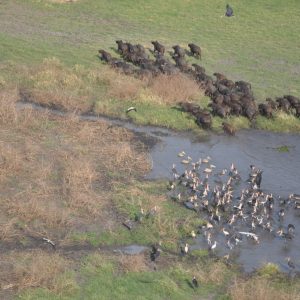Since its establishment in 2006, the Horn of Africa Regional Environment Centre and Network (HoA-REC&N) has been working on environmental conservation, natural resource management and sustainable development options within the Horn of Africa Region. Designing four programmes under its wing, HoA-REC&N has undertaken several projects in different parts of the country. One of these projects...
Category: <span>Previous projects and programmes</span>
STRONGBOW Project
The STRONGBOW (Sustainable TouRism based On Natural resource management with Gender Balance tOwards Women) project was designed to build capacity within five selected Higher Education Institutions (HEIs) in Ethiopia in the fields of Natural Resources Management, Tourism and Ecotourism. Since 2011, STRONGBOW, with its consortium of local, regional and overseas partners, has implemented a sustainable...
WASH Project- HoA-REC&N
The Water, Sanitation and Hygiene (WASH) project at the Horn of Africa Regional Environment Centre and Network (HoA-REC&N) aimed to improve human health and reduce poverty in the Central Rift Valley (CRV) of Ethiopia, through increased and sustained access to improved water supply and sanitation services. The project introduced new and innovative technologies which brought...
Water Allocation Plan Development
Understanding the challenges posed to water resources in the Ziway sub-basin of Ethiopia, Water Allocation Plan Development project of HoA-REC&N aimed to develop and pilot a socially equitable and economically viable water allocation plan that also recognized ecosystem water flow requirements. The rationale for the implementation of this project was that the unsustainable water use...
The Horn Re-Greening Programme
The Horn Re-Greening Programme was established to protect valuable ecosystems and the biodiversity in the Horn of Africa region, rehabilitate degraded areas, and enhance the benefits of ecosystem goods and services. It aimed to address key environmental and social issues in relation to land degradation. In doing so, the programme sought proper conservation and management...
Environmental Service and Climate Change Analyses Programme (ESACCAP)
With financial support from SCIP (Strategic Climate Institutions Programme), the Horn of Africa Regional Environment Centre and Network (HoA-REC&N), in partnership with the Climate Science Centre and the Ethiopian Academy of Sciences, had implemented Environmental Service and Climate Change Analyses Programme (ESACCAP). Officially launched on October 30, 2013, ESACCAP was an initiative aimed at improving...
TERI-HoA-REC&N Clean Energy Project
The Horn of Africa Regional Environmental Centre & Network (HoA-REC&N) and The Energy and Resources Institute (TERI) based in India partnered in May 2012 to jointly implement a Clean Energy Access Program in Ethiopia, with funding support from the United Kingdom Department for International Development (DFID) India. The Program aimed to provide poor households in...
Projects under Sustainable Energy Programme
The Sustainable Energy programme at HoA-REC&N, in collaboration with its partners, was established to address the energy problems faced by the Horn of Africa by developing, promoting and disseminating a wide range of renewable and efficient energy technologies. It ws principally geared towards improving the access, quality and efficiency of household energy. Countries in the...
Projects under Climate Change Programme
The Climate Change Programme at the Horn of Africa Regional Environment Centre & Network (HoA-REC&N) aimed to increase the adaptive capacity of the most vulnerable communities in the Horn of Africa to the shocks of climate change, and mitigate against its impacts. By promoting sustainable and participatory interventions, building capacity and investing in research, the...

